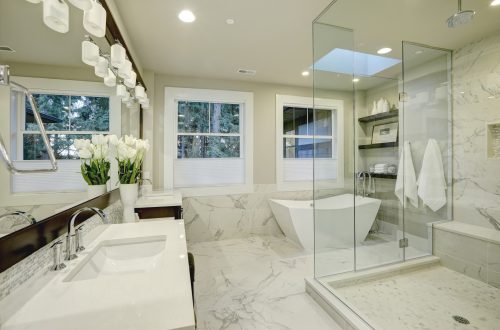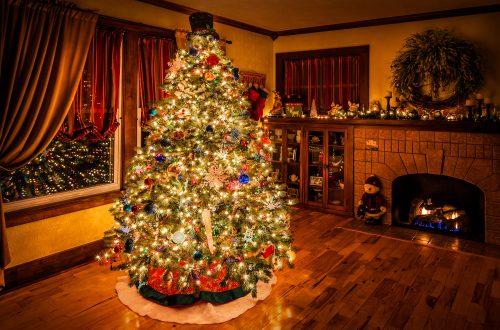Power Outages and Protecting Yourself and Your Home
Were you recently affected by the 2 back to back Nor’easter’s that blanketed the Hudson Valley area with a few feet of snow? We are expecting another Nor’easter the same day Spring begins so it doesn’t seem like winter is ready to let us have warm weather!
The first Nor’easter on March 2nd brought along heavy snow and wind gusts of 70 miles per hour. The destruction of fallen trees and down power lines were quite overwhelming to experience. Then on Wednesday 3/7/18 another storm hammered our region with another 18-/+ inches of snow. We lost power on the afternoon of Fri 3/2 and had power restored on Fri 3/9. Loosing power for a log period of time with the temperatures in the 30s can bare serious repercussions on your health and home. We aren’t doctors, so I’m not going to go into detail regarding the health consequences. But let’s talk for a moment what can happen to your home while power is out and the mechanics of the home aren’t running.
First and foremost, I would like to say that you must do what is necessary for your family to remain healthy throughout such a storm and its aftermath. Whether it be staying with family or friends that have power or a hotel for a few days. Living in a home during cold temperatures is not only uncomfortable but dangerous.
When your home is without power for a long period of time, it will rapidly loose its temperature. To remain comfortable, a typical indoor room temperature environment ranges from 65-75 degrees. When it is cold outside and the heating system is off, the house will start to lose heat. At some point, the indoor temperature may be colder than the outdoor temperature. Being too cold can seriously affect your home. It’s not so much the cold but rather the lack of humidity. You’ll notice spacing and gaps in the hardwood seams that you hadn’t notice before. You may have crown and base moldings starting to space at the miter joints and you’ll see the caulk cracking. While this is typically an easy fix and may even fix itself once the house regains power and the heating system is up and running, you MAY experience some damage that needs fixing and replacing. You do not want to allow your hardwood floor to become too cold because it will contract too much. While it’s normal for hardwood to expand and contract based on moderate temperature fluctuations, allowing a house to become too cold can ruin the floor- especially if that floor was just installed. If your floor contracts too much for a long period of time, you run the risk of it not expanding back to its original size.
Now if your indoor environment is below the freezing point, that is when things can become dangerous. Your pipes will freeze. Frozen pipe damage can range from needing a pipe or two replaced, to needing to file an insurance claim because the walls, floor, ceilings, pipes, radiators, boilers and personal belongings have been damaged. Not to mention pipes freezing above a parked car in the garage can damage it. This is definitely NOT something that we would want to happen to our clients. Regardless of the amount of work we would receive from this, just knowing what our client is going through because of this is terrible!
If your power is out for a long enough period of time, your freezer and refrigerator will thaw. This often causes the refrigerator to leak all excess water. This can be a disaster if you have hardwood in your kitchen. This is a bit hard to prevent as it happens starting under the refrigerator and will slowly leak to the area where you can see it. As soon as you see water on the floor wipe it up. At the point you know the refrigerator has thawed enough to leak the water. Keep a constant eye on it so you can wipe up any other water that leaks onto your floor. If you have had a refrigerator leak, call us and we’ll be able to come out and assess the damage of the wood. Depending on the severity, you may be able to remedy it with a sanding and refinishing. In other instances, the floor will need to be replaced.
Drain all systems and open faucets to release pressure. Frozen pipes happen very often. On top of it being a costly fix, it is a very inconvenient circumstance as the water to your home must remain off until all leaks and pipes are fixed. Not only that, but frozen pipes can damage much more than just the pipes. It can damage walls, floors, ceilings, radiators, boilers, etc. If your heating system which runs on water, your heat will need to remain off during this fix. Fixing frozen pipes is time consuming and depending on the damage can take several days.
Generator. If you are in an area where you typically lose power during a strong storm, investing in a generator is a very smart idea. While they are quite expensive, they are worth it. We lose power about once a year in our area. While we have never had a power outage for as long as this one, having a generator makes sense. Keep your portable generators a good distance from your home so that is a fire erupts, you have time to put it out without you home being effected.
Space heaters. Propane powered space heaters can be quite convenient to heat a space. But you must be very careful with the CO(carbon monoxide) levels in your home.
Smoke and carbon monoxide detectors. VERY IMPORTANT. This point coincides with the above point. Thee should be permanent fixtures in your home regardless of a power outage or not. Needless to say that during a power outages with the use of space heaters, you SHOULD have these detectors in your home with new batteries and in working order.
Extra Batteries and Flashlights. Keeping extra batteries is very important. Make sure that your batteries are the correct ones for your smoke alarms and CO detectors.
Extra Gasoline. If you have a generator that runs on gasoline, you know just how much you need to keep it running. Keep gas reserves on hand so that your generator remains powered.
Document everything if there is damage. If severe damage occurs, please do not forget to document, photo and date everything. Keep careful track of whom you speak with and what is being told. Hire a restoration company if needed. They’ll be able to help and they’ll work with your insurance company to get those damages repaired.
Candles. Candles can create quite the ambiance. However, during a power outage, we’re using them for light to see in the dark. Don’t forget to blow out any candles before leaving and falling asleep.
Fire Extinguishers. When you are using a fire to heat your home, or candles to light your home, there is always some risk involved with open flame. Keep a fire extinguisher near when using such methods to heat and light your home.
If you are staying away from your home during the power outage, please check on your home daily. Do not wait for the power restore alert. Checking on it daily will allow you
You May Also Like

2020 Tile Trends
October 23, 2019
37 Comments
Pingback:
Pingback:
Pingback:
Pingback:
Pingback:
Pingback:
Pingback:
Pingback:
Pingback:
Pingback:
Pingback:
Pingback:
Pingback:
Pingback:
Pingback:
Pingback:
Pingback:
Pingback:
Pingback:
Pingback:
Pingback:
Pingback:
Pingback:
Pingback:
Pingback:
Pingback:
Pingback:
Pingback:
Pingback:
Pingback:
Pingback:
Pingback:
Pingback:
Pingback:
Pingback:
Pingback:
Pingback: